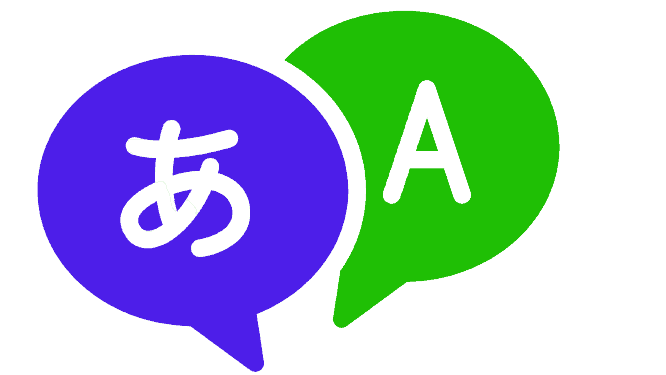Ready to embark on a linguistic adventure? 🚀🌍 It might be challenging to choose the ideal language-learning software, but do not worry! Meet Rosetta Stone and Rocket Languages, two industry leaders in language learning. If you’re pondering which one’s your ideal match, we’ve got your back. Discover the strategies behind their engaging courses, cultural insights, and fluency in the real world. Prepare to overcome linguistic hurdles and open up a world of opportunities. Let’s dive in and discover which path leads to your language mastery!
Rosetta Stone vs Rocket Languages Compared
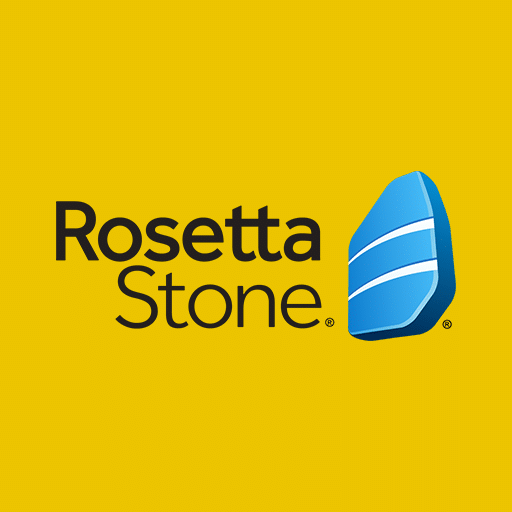
- Number of Languages: 25
- Free Trial (or free version): Yes
- Speech Recognition: Yes
- Avg. Lesson Length: 18 Minutes
- Pricing: $11.99
- Money Back Guarantee: 30 Days
- Grammar Instruction: Better
- Live classes: Yes
- Progress Tracking: Yes
- Tests/Quizzes: Yes
Rosetta Stone Overview
The well-known language learning program Rosetta Stone is recognized for its immersive and visual method of language learning. The emphasis of the curriculum is on contextual and associative learning, which is similar to how we naturally pick up our first language. It’s interactive lessons include images, audio, and text to help learners connect words with their meanings.
Through its voice recognition technology, the platform puts a major emphasis on pronunciation, assisting students in learning proper accents. Rosetta Stone strives to develop fundamental language abilities and cultural awareness via the large range of languages it offers. Language learning is made fun and simple with this program’s user-friendly interface and adaptive learning method, which cater to students of all ages and educational levels.
My Rosetta Stone Experience
My experience with the Rosetta Stone website and app has been an interesting exploration into language acquisition. I could choose my competence level as a novice, intermediate, or expert student after signing in. When I chose the novice level and “work” as my aim, I was pleased with the user interface’s clarity and responsiveness.
The platform quickly set up my microphone for my first Spanish session and challenged me to enunciate simple Spanish phrases. This task was made more challenging by the lack of translations, which forced me to concentrate on pronunciation alone. The possibility of scheduling in-person lessons with native speakers stood out as a perk since it offered a real-world education.

It was noteworthy that Rosetta Stone offered a variety of courses that catered to many situations, like travel, education, employment, and shopping. The availability of on-demand videos created to assist students sound like native speakers is what really caught my attention. This function seemed like a thoughtful addition that helped me in my search for accurate pronunciation and fluency.
It was striking how diverse the platform’s material was. Rosetta Stone provided a wide variety of tools, including phrasebooks, audio companions, alphabet courses, and language fundamentals. The exposure to various learning styles – pronunciation, vocabulary expansion, grammar, reading, and writing – impressed me even more.
With this strategy, a well-rounded learning experience that included all facets of language acquisition was guaranteed. Also, live classes are also there if anybody wants to interact live with the tutors.
It was amazing to have the option to interact with tales by reading, listening to them, or even filming myself reading them. I learned crucial conversational skills from the phrasebook portion that I can employ for business meetings, greetings, hotel stays, and eating out.
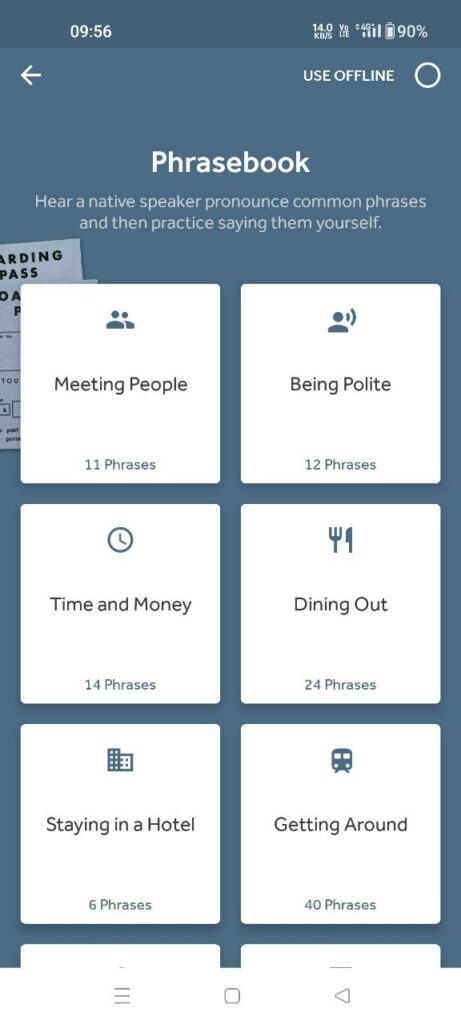
Drawbacks
Although I had a generally pleasant experience with Rosetta Stone, the main issue I had was with the online version’s poor loading time. Despite this, the variety of features, interactive materials, and individualized learning possibilities made using this app for language learning enjoyable.
Next, the availability of only a 3-day free trial limited my initial exploration of the platform. After this time, access to the free materials became restricted and required a commitment to a paid study plan.
The lack of translations in the learning process was a huge obstacle I faced. Although this strategy promoted immersion, it also made the learning curve more difficult, especially for novices. When translations were available, getting to them may be difficult and slow down learning.
Despite these shortcomings, the Rosetta Stone platform does provide a distinctive approach to language learning with its broad diversity of material and immersive approach. Prospective students should balance these drawbacks with the advantages the platform offers, notably in terms of pronunciation, fluency, and realistic language usage.
- Immersive Learning: Rosetta Stone’s immersion approach replicates natural language acquisition, helping learners think directly in the target language and understand its context.
- Visual Context: The platform’s use of images, audio, and text together provides a visually engaging experience that aids comprehension and retention.
- Speech Recognition: The speech recognition technology provides instant feedback on pronunciation, helping learners refine their accents and speaking skills.
- Wide Language Selection: Rosetta Stone offers a broad range of languages, making it an excellent choice for those interested in less commonly taught languages.
- Adaptive Learning: The platform adapts to learners’ progress, adjusting difficulty and content to their proficiency level for a tailored learning experience.
- Flexibility: Rosetta Stone’s mobile app and offline access allow learners to practice anytime, anywhere, fitting into busy schedules.
- Contextual Learning: Rosetta Stone’s context-driven approach enhances vocabulary retention by associating words and phrases with real-life situations.
- Translation-Free Approach: The lack of direct translations might be challenging for beginners who seek immediate word meanings and context.
- Limited Interaction: Rosetta Stone might not offer as much interaction with peers or instructors as some other platforms, which could impact collaborative learning.
- Stricter Pronunciation Assessment: The speech recognition technology’s strictness might lead to occasional frustration, especially for learners with accents or those still developing their speaking skills.
Rocket Languages Overview
The complete language learning platform Rocket Languages was created to make learning a new language fun and efficient. The curriculum provides a variety of languages, enabling students to choose the one that most appeals to them. It places a strong emphasis on utility, giving users conversational abilities for everyday situations.
Rocket Languages provides interactive lessons that cover reading, writing, listening, and speaking skills. It includes culturally relevant information to improve comprehension and enjoyment of the language.
The site also has tools that help learners improve their speaking skills, such voice recognition and pronunciation practice. It provides learners of all abilities and backgrounds with a customizable learning experience thanks to its user-friendly design and mobile app accessibility.
My Rocket Languages Experience
The Rocket Languages app and website have exceeded my expectations in every way. My attention was immediately drawn to the polished and interesting online user experience. I chose the German language study course, and even with the free trial plan, I was pleasantly impressed by the wealth of information.
It was especially useful to include extended audio talks that lasted 15 to 20 minutes. It was fun to learn by listening to these discussions, repeating phrases, and using voice recognition technology to rate my performance.
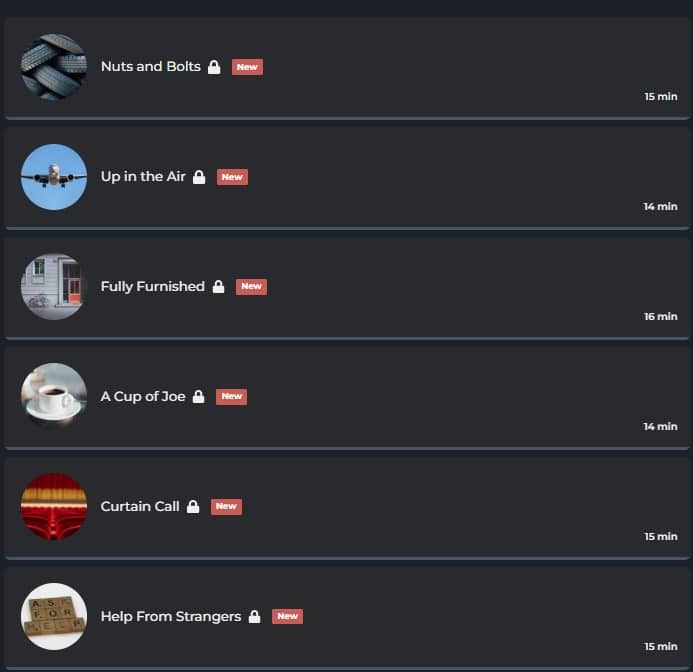
The numerous portions offered by Rocket Languages made it clear that the company placed a great focus on expanding vocabulary. For instance, the flashcards function provided an excellent, low-pressure way for me to reinforce my learning. The “Hear it, Say it” option helped me comprehend spoken German better since I could listen and videotape myself to see how well I understood it.
The “Write It” feature helped me become better at writing in German and understanding sentence patterns. In addition, the “Know It” component forced me to translate, which improved my language proficiency in both ways. In order to assess my progress, the app also has a Quiz section with multiple-choice questions.
The variety of elements outside of classes jumped out. A feeling of community and incentive were introduced to the learning process through the addition of a Leaderboard, Certification, stored notes, and forums. When I searched the boards, I saw people were actively debating German terms, phrases, and other topics.
The lectures on the Survival Kit were one unique feature that I thought was really useful. These courses gave me the terminology I needed to order coffee and make hotel reservations in everyday situations. A thorough learning experience was offered by the 8–10 audio lessons that made up each of the 23 modules.
The quickness and simple navigation of the Rocket Languages website made it a pleasure to use. The app was equally straightforward, which made studying while on the road a snap. I was inspired to keep studying by being able to track my development via the daily points I gained and compare my performance to others on the scoreboard.
The platform distinguished itself from other platforms like Mondly with its comprehensive material, engaging features, and simple navigation. Overall, my time with Rocket Languages has been useful and enjoyable in my effort to study German.
Drawbacks
However, I did have a few issues when using the Rocket Languages app and website. One factor that stood out was how little gamification was there. Although the site had excellent audio material, I believed that adding additional gamified aspects may improve learning and keep users interested.
The tests also looked to be quite short with just five questions apiece, despite their value. I felt that I needed more thorough evaluations in order to fully measure my development and knowledge.
It was also apparent that several modules lacked a substantial collection of images and video material. Incorporating more visual aids could have added a dynamic dimension to the learning process and helped reinforce concepts more effectively.
- Comprehensive Learning: Rocket Languages offers well-structured and comprehensive language courses that cover various aspects of language learning, including reading, writing, listening, and speaking.
- Interactive Lessons: The platform provides interactive lessons, quizzes, and role-playing exercises that keep learners engaged and encourage active participation.
- Cultural Insights: Rocket Languages emphasizes cultural understanding, providing insights into the language’s cultural context, customs, and etiquette, enhancing cross-cultural communication.
- Voice Recognition: The voice recognition feature helps learners practice and refine their pronunciation by comparing their spoken words to those of native speakers.
- User-Friendly Interface: The intuitive interface, available both on the web and mobile app, makes navigation and learning a seamless experience across devices.
- Progress Tracking: Rocket Languages offers comprehensive progress tracking tools, allowing learners to set goals, track their advancement, and identify areas for improvement.
- Supportive Community: The platform’s online community enables learners to interact with peers, ask questions, share experiences, and practice their language skills.
- Limited Language Selection: While Rocket Languages covers a variety of languages, its selection might be more limited compared to other platforms.
- Less Immersive Visuals: Compared to some other platforms, Rocket Languages might offer fewer immersive visuals, which could impact certain learning styles.
- Cost: The minimum cost at which you can get access to paid materials is $99, which is too high as compared to other language learning apps in the market.
Rocket Languages & Rosetta Stone Detailed Comparison
User Interface and User Experience (UI/UX)
When it comes to user interface and experience, I found both Rocket Languages and Rosetta Stone to have their unique strengths. My interest was piqued by Rocket Languages’ simple, clear UI.
The platform’s adaptable design made it easy to go through the courses whether I was using the browser version or the app on my phone. I liked how each lesson was divided into reasonable chunks, making it simple to monitor my progress. The layout was well-organized.
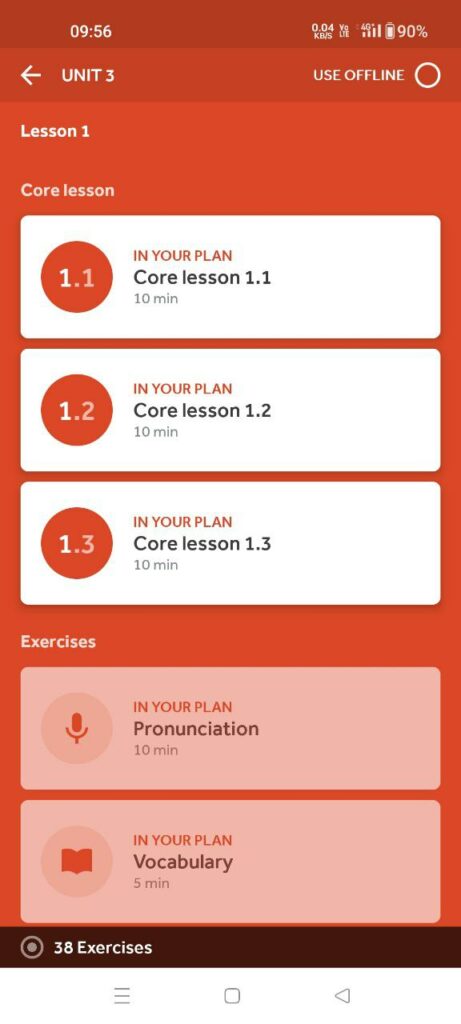
On the other hand, Rosetta Stone’s interface impressed me with its visual appeal. The combination of text, audio, and visual elements produced an atmosphere for learning that made me feel as if I was really surrounded by the language. It took me a little while to get familiar to the navigation, but once I did, I valued the methodical introduction of new terminology and ideas over time.
Both systems included interactive exercises to support learning in terms of experience. I was particularly impressed with Rocket Languages because of its interesting tests, role-playing activities, and authentic chats.
I valued the way these exercises enabled me to put what I had learned to use in real-world situations. Rocket languages app really improved my speaking abilities by using the voice recognition option, which enabled me to compare my pronunciation to that of native speakers.
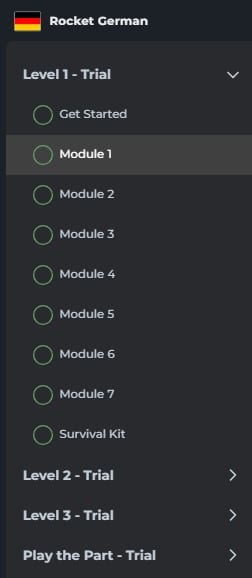
Rosetta Stone’s experience, on the other hand, felt like an immersive journey. Every lesson displayed the platform’s emphasis on context- and association-based learning. Although it was sometimes too rigorous, the voice recognition technology always pushed me to work on my accents and tones. It also provided me with opportunities to practice my pronunciation.
Overall, both systems provided satisfied users. Rosetta Stone offered an immersive learning environment with a distinct visual learning style, whereas Rocket Languages offered an interactive and thorough approach. The decision between the two would mostly rely on whether you want an immersive, context-driven approach (Rosetta Stone) or a more structured, interactive experience (Rocket Languages).
Language Course Selection
Starting with Rocket Languages, I was impressed by their range of 13 languages. I liked that this application concentrated on offering thorough and in-depth lessons for each language they provided, even if the selection may not be as broad as Rosetta Stone’s.
This gave me hope that I could really master the language I wanted to learn. The average class lasted 55 minutes, which gave me enough time to go deeply into each subject and fully understand the principles.
On the other hand, it’s offering of 25 languages was definitely a strong point. I had the opportunity to investigate languages that would not be offered on other platforms because of the outstanding diversity.
What languages does Rosetta Stone have? You can select any langauge & change it later. Here’s the list:
- Arabic
- Chinese (Mandarin)
- Dutch
- English (American)
- English (British)
- Filipino (Tagalog)
- French
- German
- Greek
- Hebrew
- Hindi
- Irish
- Italian
- Japanese
- Korean
- Latin
- Persian (Farsi)
- Polish
- Portuguese (Brasil)
- Russian
- Spanish (Latin America)
- Spanish (Spain),
- Swedish
- Turkish
- Vietnamese.
However, compared to Rocket Languages, the average class time of 18 minutes seemed a little bit shorter. While this made for shorter, more efficient learning sessions, I sometimes wished that each course had been more in-depth.
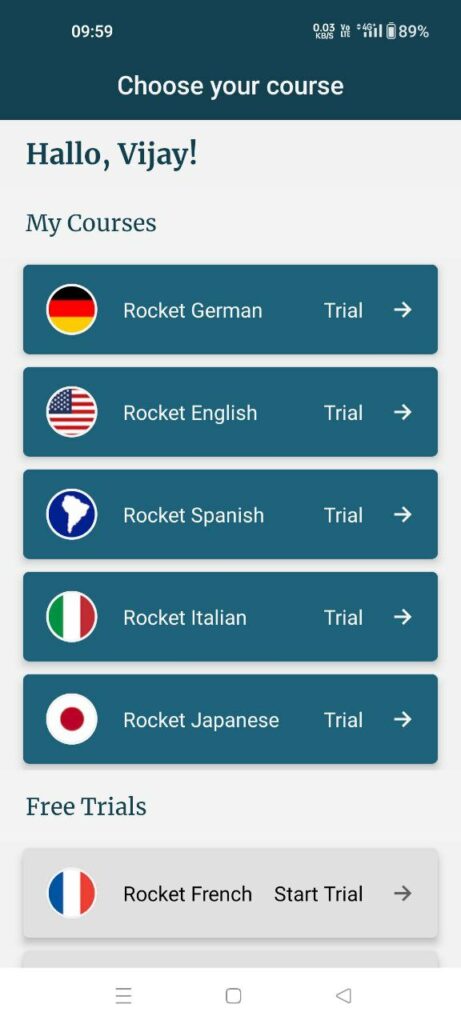
I discovered that Rocket Languages’ courses were organized in a manner that made for a well-rounded learning experience. The instruction was comprehensive, including not just vocabulary and grammar but also cultural context and conversational skills. I had the impression that I was genuinely learning the language and its context thanks to this all-encompassing approach.
However, Rosetta Stone’s focus on a fully immersive visual approach was also seen in the courses they chose. Each lesson’s usage of graphics and music made me feel as if I was surrounded by the language, which improved my understanding and retention. Although the shorter course duration was practical for rapid learning on the fly, I sometimes wanted for more chances to explore challenging subjects.
Learning Methods and Techniques
Rocket Languages impressed me with its practical and interactive approach. The learning platform makes use of many teaching techniques, such as quizzes, role-playing games, and in-person discussions.
This variety of tasks kept me interested and gave me chances to use what I had learned in practical situations. The voice recognition tool was very fun since it let me practice pronouncing words and hear how they sound when spoken by people who are native speakers.
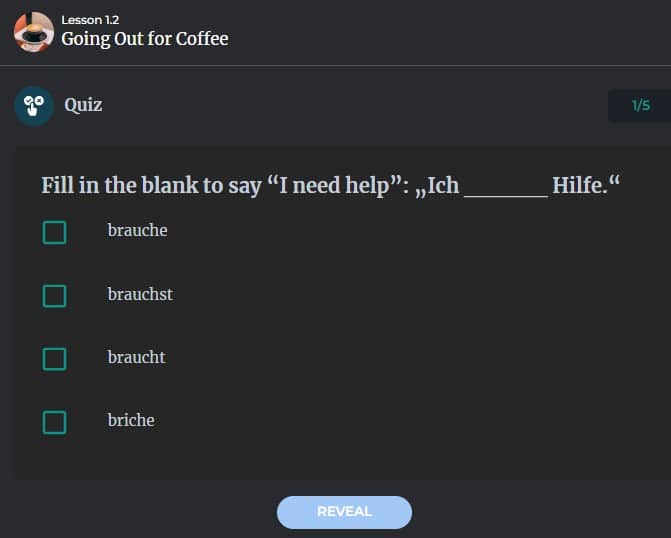
On the other hand, Rosetta Stone’s learning methods are centered around immersion and context. The platform places a focus on learning via association by combining text, audio, and visual elements.
By using a visual method, I was able to pick up words and their meanings in a manner that was similar to how we learn our first language. The voice recognition technology regularly pushed me to improve my pronunciation, which was both motivating and beneficial in honing my speaking abilities.
Although both of them provide useful learning methods, they take different approaches. While Rosetta Stone’s immersive images emphasize context and association, Rocket Languages’ interactive activities provide a hands-on learning experience. Most likely, the tool that fits your learning style best will depend on whether you like learning to be more involved or more visually immersive.
Gamification and Engagement
Rocket Languages successfully and subtly uses aspects of gamification. As you go through classes and exams, the platform recognizes your accomplishments with points and badges, fostering a feeling of pride.
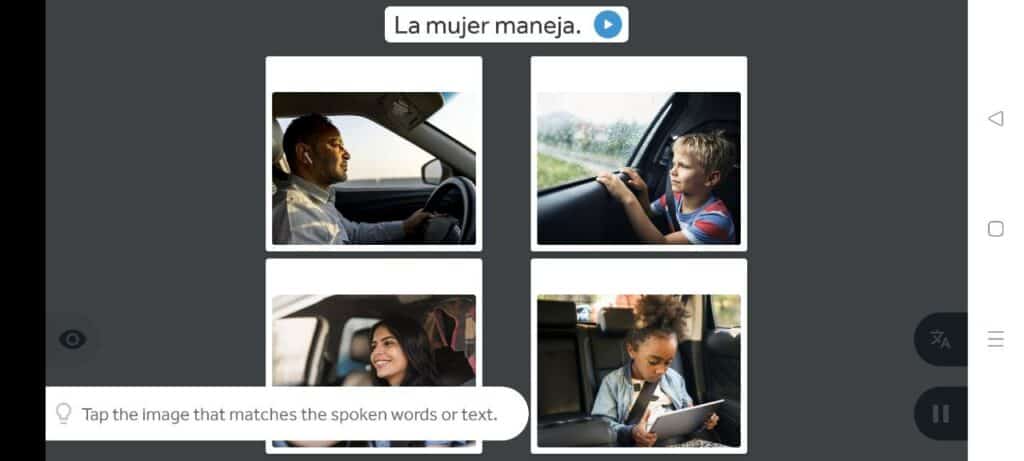
I was inspired to keep studying and go for better accomplishments by this gamified method. In addition, the interactive challenges and role-playing activities in the classes kept me interested and made studying fun.
Rosetta Stone concentrates on creating an immersive and aesthetically captivating experience. The integration of pictures, music, and contextual learning makes the environment more engaging even if it may not largely depend on standard gamification components. I remained engaged in the sessions because to the real-time feedback on pronunciation and the prompt reinforcement of right responses.
While Rosetta Stone uses an immersive method to keep learners interested in the material, Rocket Languages uses gamification to make the learning process pleasant and engaging. You can pick the platform that best suits your tastes based on your reasons for doing so, such as whether you’re inclined to gamification or visual engagement.
Pronunciation Practice
Rocket Languages places a strong emphasis on pronunciation practice. I was able to speak words and phrases into the platform’s voice recognition technology, which then compared my pronounciation to that of native speakers.
This in-the-moment criticism was quite helpful in pointing out my weaknesses and honing my accent and intonation. This feature’s interactive aspect gave me the impression that I was speaking with a language companion while I practiced.
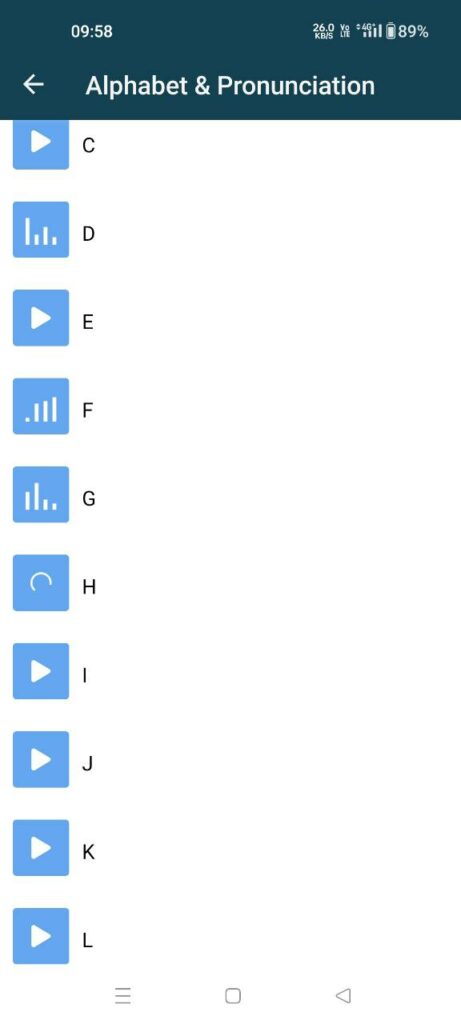
Through its voice recognition technology, Rosetta Stone also places a high priority on pronunciation. The software asks users to say words and phrases, then assesses how accurately they pronounce them.
Although I used this option to improve my accents and tones, I sometimes felt it to be a little harsh in its evaluation, which caused a few unhappy moments. But with time, the consistent repetition helped to improve pronunciation.
Through their voice recognition algorithms, Rocket Languages and Rosetta Stone both provide helpful practice aids for pronouncing words. It’s method is similarly excellent in assisting students in improving their pronunciation, even if Rocket Languages could provide a more engaging experience.
Progress Tracking and Analytics
The next difference between Rosetta stone & Rocket languages lies in the progress tracking feature. It provides comprehensive progress tracking tools that allowed me to monitor my advancement in each course.
The platform included concise summaries of the lessons that had already been covered, the subjects that would be covered next, and the percentage of the course that had been finished.
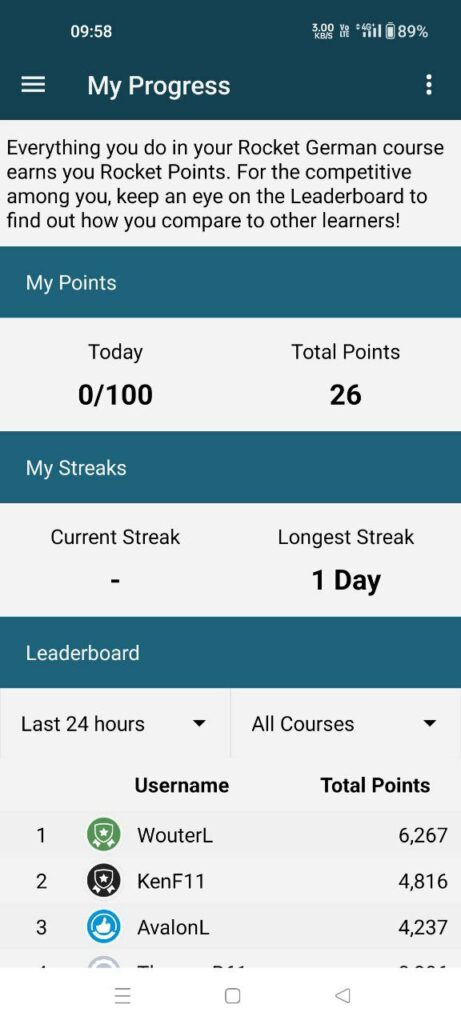
I could quickly gauge my progress, which kept me motivated and organized. The thorough analytics also showed me areas where I could need more practice, which helped me focus on where I needed to develop.
On the other hand, Rosetta Stone’s progress tracking was slightly more subtle but still effective. I could see on the platform how many lessons I had already finished and how much of the course was left. I did not, however, get the same amount of insight into my strengths and limitations as I did with Rocket Languages, and the analytics appeared to be less thorough.
Rocket Languages provides thorough statistics and progress monitoring that give you a clear view of your progress and let you to concentrate on certain areas. Rosetta Stone offers progress monitoring as well, although it could be more appealing to people who want a more straightforward summary of their course completion.
Mobile App Features
I was delighted by the user-friendly UI and smooth transition from the online platform in the Rocket Languages mobile app. The app offered full access to lessons, quizzes, and interactive activities, ensuring I could continue my learning on the go.
I particularly enjoyed the convenience of practicing pronunciation using the voice recognition feature directly on the app. Because the app synced with the website, I could switch between devices without losing my work.
In contrast, the accessibility of Rosetta Stone’s smartphone app was similarly excellent. The app’s visual and interactive teachings were mobile-friendly, enabling me to study whenever I had a leisure moment.
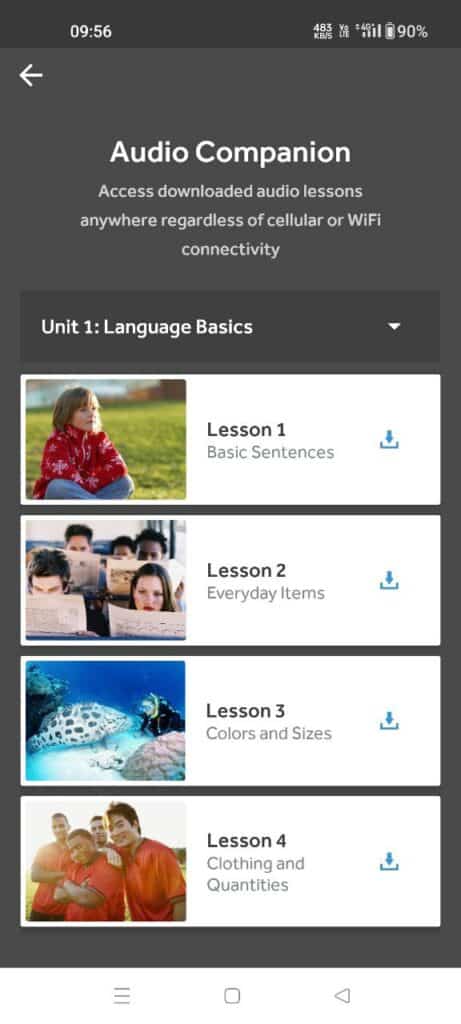
While the voice recognition technology was sometimes rigorous, it was neatly incorporated within the app, allowing me to practice pronunciation whenever and wherever I wanted.
Both applications provide useful features for mobile learners. Rocket Languages’ smooth platform switching and all-inclusive feature access made learning simple and reliable. Mobile learners were well-served by Rosetta Stone’s visually engaging courses and built-in voice recognition on the app. Platform synchronization (Rocket Languages) or a visually appealing mobile experience (Rosetta Stone) would determine your pick.
Vocabulary Building Tools
Rocket Languages offers a variety of vocabulary-building tools that I found quite effective. The software helps me grasp terms in everyday contexts by introducing new terminology in context-rich phrases.
Flashcards and tests enabled me to improve my memory, and the spaced repetition function made sure I went over things at the right times to help me remember them. Additionally, vocabulary was naturally included into the platform’s interactive training, making it simpler to recall and use new phrases.
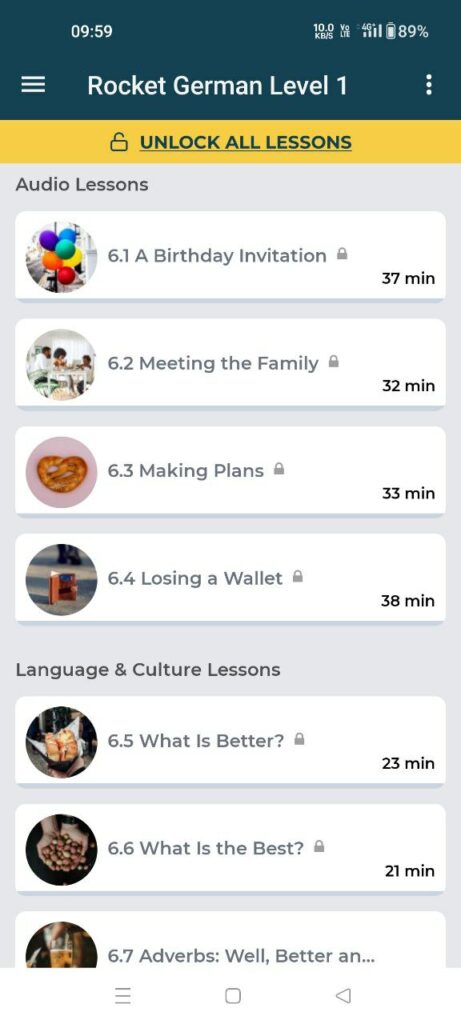
Rosetta Stone combines an immersive learning environment with a vocabulary-building strategy. Without using translations, the visual combination of the visuals, sounds, and text helped me understand new terms.
The acquisition of language seemed obvious and natural as a result of the contextual learning. For people who want organized learning in this area, the absence of specific vocabulary-focused aids like flashcards or quizzes might be a disadvantage.
Rocket Languages uses flashcards and quizzes to develop vocabulary. Rosetta Stone uses pictures and relationships to teach new words in context. Choose a platform that suits your learning approach, whether you prefer systematic vocabulary drill or contextual immersion.
Offline Learning Options
Through its smartphone app, Rocket Languages provides a practical offline learning experience. I like the ability to download lectures, tests, mp3 audio files and interactive exercises on my device.
This made it possible for me to continue studying even when there was no internet access, making it perfect for circumstances where connectivity could be restricted. When I didn’t have access to the internet, I could still monitor my progress and sync it with the online platform.
Using its mobile app, Rosetta Stone also provides offline study. I could download the courses and access them when offline, much as with Rocket Languages. Because it’s courses are so graphically engaging, they transferred well to the app, making it simple to interact with the content without an online connection.
When connection is a problem, both platforms provide useful offline learning solutions that meet the demands of learners. The thorough offline access and smooth synchronization offered by Rocket Languages guarantee a never-ending learning process. The aesthetically appealing courses from Rosetta Stone work well offline as well.
Personalized Learning and Adaptive Algorithms
With its individualized teaching style, Rocket Languages won me over. Lessons are tailored by the platform to my level of expertise and rate of learning. The adaptive algorithm changed the level of the tasks as I advanced and presented harder subjects.
Because of this, I was always pushed without being too overwhelmed. The software also let me establish objectives and monitor my work, making it simple to see my development.
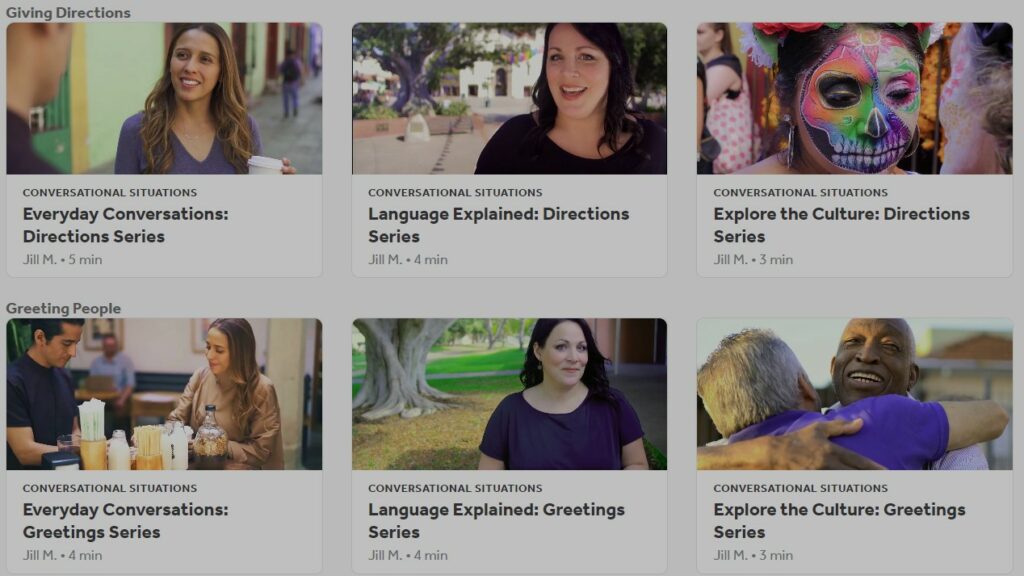
Rosetta Stone bases its personalisation strategy on the context of each lesson. Although the software doesn’t provide as many explicit customizing possibilities, its immersive learning approach permits some degree of customization. The repetitive exposure to words and phrases in different contexts aids retention and understanding.
Although both educational platforms provide customized learning opportunities, they use different methods. With the use of adaptive algorithms and more direct personalisation choices, Rocket Languages can adjust material to your learning path.
Through repetition and association, Rosetta Stone’s immersive context-driven learning also provides a type of personalisation. Structured personalisation (Rocket Languages) or contextual immersion (Rosetta Stone) will decide which platform suits your learning style.
Translations
The translation process is balanced at Rocket Languages. The platform promotes immersive learning and a contextual knowledge of the language, but it also offers translations that help students in knowing words and phrases.
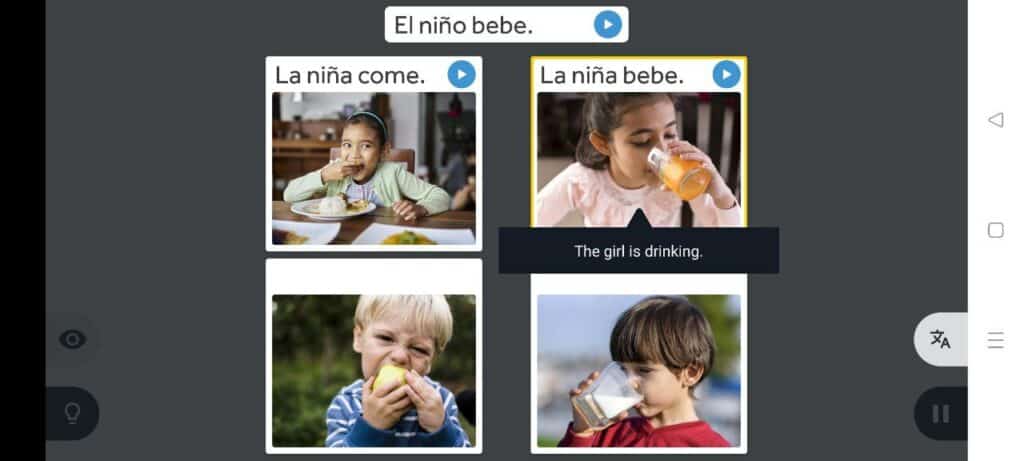
This method achieved a solid mix between understanding the language’s use in the actual world and assuring comprehension, particularly when dealing with new topics.
Rosetta Stone’s strategy is more focused on learning without translations. Instead of providing straight translations, the site encourages users to connect words and phrases to settings and visuals. This method attempts to mimic how we naturally pick up our first language, although it sometimes results in ambiguity about the precise meaning of words.
Both strategies have advantages. Rosetta Stone’s translation-free approach places more emphasis on immersion and association, while Rocket Languages’ balanced approach promotes contextual understanding while still providing clarity.
Pricing
| Plan & Platform | Number of Languages | Pricing |
|---|---|---|
| Rocket Languages | ||
| Level 1 | 1 | $99.95 (Lifetime Access) |
| Level 1 & 2 | 1 | $249.90 (Lifetime Access) |
| Level 1, 2 & 3 | 1 | $259.90 (Lifetime Access) |
| EMI (6 Months) | 1 | $47.00/mo |
| Rosetta Stone | ||
| 3 Months | 1 | $11.99/mo |
| 12 Months | 1 | $7.99/mo |
| Lifetime | 25 | $179/one-time |
Both platforms have a variety of programs to accommodate different tastes when it comes to price, return on investment (ROI), and affordability. For each language, Rocket Languages offers lifetime access options, enabling students to advance at their own rate over time. A variety of programs are available from Rosetta Stone, including trial periods for people who wish to test it out and a lifetime subscription with access to many languages.
Rosetta Stone’s lifetime subscription allows access to a greater number of languages, which may improve the overall language learning experience even if Rocket Languages may seem more cost-effective for students of a single language. Your learning objectives, the amount of languages you want to learn, and the length of access you choose will all affect how affordable something is. Even if you don’t like it, you can cancel Rosetta Stone & get full refund.
What are the key differences between these apps?
One of the main differences between the two language learning apps is the inclusion of live classes. While Rosetta Stone offers the option to schedule live classes with native speakers, Rocket Languages does not explicitly mention live classes as part of its offerings.
This feature in Rosetta Stone allows learners to interact in real-time with native speakers, enhancing the immersive experience and providing an opportunity to practice conversational skills in a dynamic setting. This difference might be a crucial factor for those who prioritize interactive and real-time learning experiences in their language journey.
Rocket Languages lays a big focus on practicality and cultural understanding. Beyond language instruction, the platform delves into the cultural nuances and etiquette of the language you’re learning.
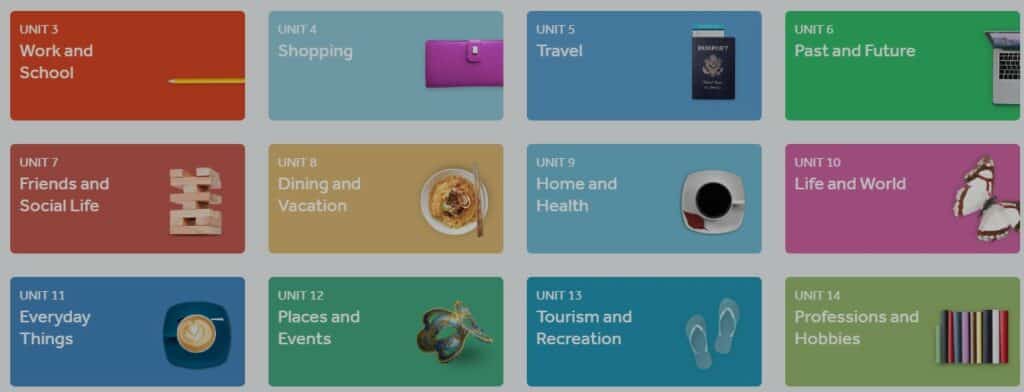
This improves cross-cultural communication abilities and gives a greater awareness of how the language is utilized in everyday situations. In addition, Rocket Languages has a special ‘Survival Kit’ part that provides students with key words and phrases for traveling and everyday life in the target language-speaking nations.
On the other hand, Rosetta Stone’s immersive learning experience is highly visual and contextual. For expert learners looking to hone their language abilities, the platform’s approach of not using translations may be very successful.
It promotes direct linguistic thinking rather than depending on translation, which may help with the development of fluency. However, it may initially be difficult for novices, particularly if they prefer having explicit translations as a reference.
The social component is another notable distinction. With the help of Rocket Languages, users can interact with other language enthusiasts online and exchange questions and practice exercises. This feeling of community could be inspiring and beneficial, particularly when looking for more support or direction. Rosetta Stone, which emphasizes solo study without much contact, may appeal to individuals who like that.
As a result of its emphasis on useful words, cultural insights, and an encouraging online community, Rocket Languages distinguishes apart. Rosetta Stone excels with its immersive, translation-free methodology that encourages students to think in the target language directly. Your decision between the two will be influenced by your learning preferences, priorities, and degree of importance placed on cultural knowledge or immersion.
Rosetta stone is best for whom? & how?
Rosetta Stone is ideal for students desiring an immersive, context-based language-learning experience that encourages direct thinking and comprehension in the target language. It is a great option if you want to become fluent and have a natural flow in conversation without using translations.
Since the platform employs graphics, audio recordings, and contextual learning to mimic how we learn our first language, it is especially useful for those who value a visually appealing approach. Rosetta Stone’s voice recognition technology offers in-the-moment feedback for precise pronunciation if you’re trying to improve your speaking and listening abilities.
Advanced language learners who want to hone their language abilities without relying on translations will find Rosetta Stone to be a perfect match as well. The goal of this approach is to promote thinking and comprehension in the target language, which might eventually lead to increased fluency. It works particularly well for students who wish to create a linguistic “instinct” that makes dialogue flow easily and naturally.
Rosetta Stone is the best option for anybody looking for an immersive, translation-free learning method to improve conversational fluency and strength via visual interactions.
Rocket languages is best for whom? & how?
The people who want a thorough and dynamic language-learning experience that emphasizes utility and cultural awareness should choose Rocket Languages. It is a great option if you want to learn the language while also getting a better understanding of its use in daily life and cultural background.
For students who prefer an organized approach with interactive courses, tests, and role-playing activities, the platform is very helpful. The language platform provides individual monitoring and progress data, making it ideal for goal-setters.
The online community of Rocket Languages can be inspiring if you value having a welcoming group of people to interact with, practice with, and ask questions to. The ‘Survival Kit’ option is also a special benefit for tourists or anyone who want to speak quickly in emergency situations.
In general, Rocket Languages serves those who desire a well-rounded learning experience that not only aids in language proficiency but also gives them the practical skills needed for successful communication and intercultural interaction.
Rosetta Stone user Feedbacks
Users of the Rosetta Stone app express a generally positive sentiment towards the immersion learning approach it offers. One user emphasizes the value of immersion learning, which fits their preferred learning method.
However, they draw attention to difficulties with the picture-selection task because of the pictures’ tiny size, which might sometimes result in errors. Additionally, they say that having the option to translate on every page would be helpful for them since it enables them to cognitively connect words with associated pictures.
Another reviewer mentions a few usability issues while praising the app’s usefulness. They point out that the software may sometimes be too sensitive when detecting clicks during workouts, which might lead to unexpected results.
Independent app users also provide information on the recording function, pointing out that for correct playback, there is a slight lag between the audio cue and the recording itself. They still see the app as a good and practical tool for language study on the road in spite of these small difficulties.
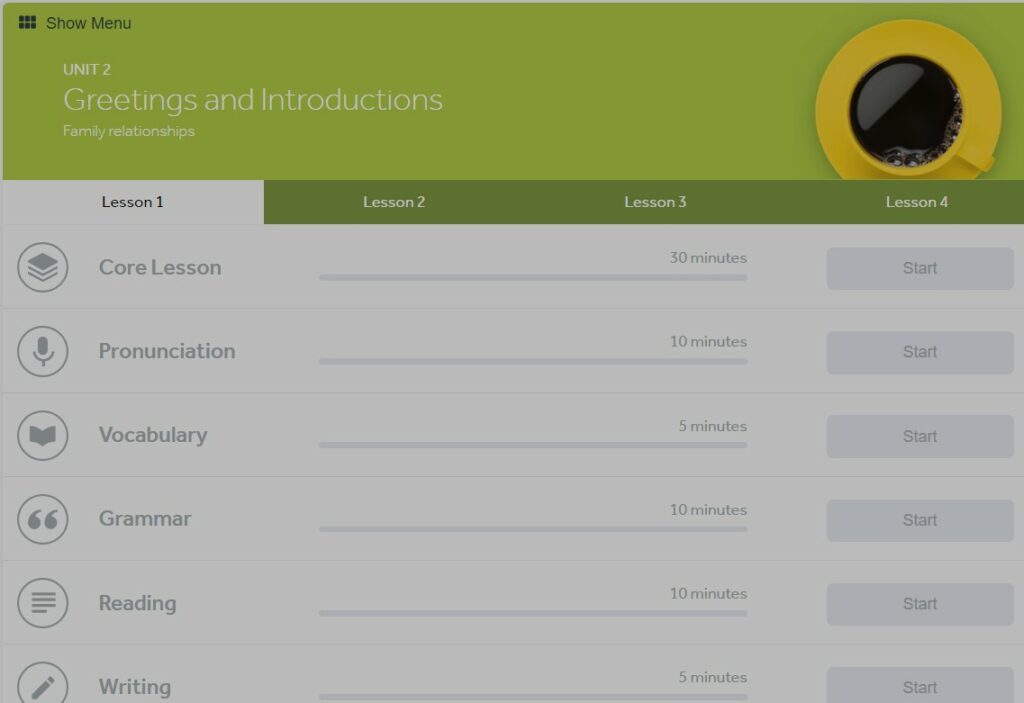
Is Rosetta stone good for French? Another user, who has just recently started studying French, reveals their first findings. They consider the app to be successful and promising, especially given that it includes useful visuals and pronunciations.
They note that the lessons may feel slow-paced at the beginning, but anticipate that this might change as they look into less familiar material. Like previous reviewers, they say the word-matching graphics sometimes be too tiny to see.
Lastly, a user commends Rosetta Stone for its method of teaching, saying that it is simple and pleasant. They emphasize how the app’s first immersion in words and graphics helped learning “click” for them.
They highlight the app’s usefulness, particularly when contrasted to the numerous alternative learning strategies they had previously used. The provision of a free trial option is seen favorably since it gives users the chance to test the app without taking any risks.
Rocket Languages user Feedbacks
Users of the Rocket Languages app generally appreciate its utility, with some minor points of improvement. One user says the software is useful but reports that the recording function sometimes has problems.
They thank the Rocket Languages team for listening to feedback and note how much they value enhancements that were developed in response to user feedback. They remark that, despite sometimes frustrating grading faults, the audio and scoring system serve as motivational components for their learning journey. Their readiness to improve their rating demonstrates the beneficial effects of prompt customer service.
Another reviewer praises Rocket Russian for having solid foundational material and useful content, calling it a near-perfect language learning program. They understand that learning a language while maintaining a hectic schedule may be difficult, but Rocket Russian lives up to their expectations.
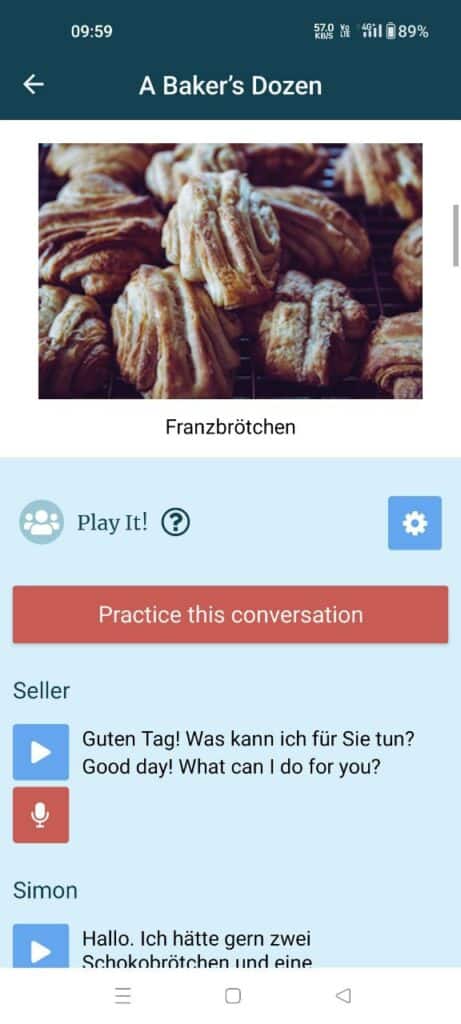
They stress how regular language use promotes language development. The reviewer highlights that the plethora of sound bites helps with ear training despite the speech recognition’s flaws. The lifetime licensing concept of the app, as opposed to a subscription, is also very appreciated.
As a complement to books and other applications, a user who has used Rocket Languages for both Japanese and Russian finds the courses to be generally positive. They say they had a good time, although they do point out differences between the website and the android app.
They specifically point out the problem of not being able to listen to the recordings made by the app, which hinders immediate feedback on pronunciation. The recording interfaces are also difficult for them to use.
And last, a student who switched from Duolingo Italian to Rocket Languages reports considerable improvements in their learning process. They emphasize that it delivers growth and that the learning component is better than their prior platform. They draw attention to the rare voice recognition and playback issues but consider the overall learning process to be a significant improvement.
Rocket Languages & Rosetta Stone- Summary
Rosetta Stone
Total Languages: 25
Starts from: $11.99
30 Days Money Back Guarantee
What did We like?
🌍Rosetta Stone offers a cutting-edge approach to language learning that completely immerses users in their chosen language. It encourages a natural fluency and genuine comprehension using images, context-driven learning, and voice recognition technologies. Rosetta Stone offers a broad variety of languages and adaptable learning to suit different tastes. You can study at your convenience, thanks to its mobile app and offline accessibility. For a compelling, translation-free experience that encourages self-assurance and useful language proficiency, choose Rosetta Stone.
- Immersive Learning
- Visual Context
- Speech Recognition
- Wide Language Selection
- Adaptive Learning
- Flexibility
- Contextual Learning
- Translation-Free Approach
- Limited Interaction
- Stricter Pronunciation Assessment
Rocket Languages
Total Languages: 13
Starts from: $99
60 Days Money Back Guarantee
What did We like?
🚀Rocket Languages offers an immersive and culturally rich language learning journey. It’s ideal for individuals looking for a thorough and interesting experience since it has interactive courses, real-world interactions, and individualized progress monitoring. The platform’s focus on practical communication and cultural knowledge gives users more than just verbal abilities. Join a vibrant community for peer support and take advantage of the user-friendly online and mobile interfaces. Rocket Languages can help you become fluent in any language.
- Comprehensive Learning
- Interactive Lessons
- Cultural Insights
- Voice Recognition
- User-Friendly Interface
- Progress Tracking
- Supportive Community
- Limited Language Selection
- Less Immersive Visuals
- Costly
Rosetta Stone offers a broader range of languages, with 25 options available, while Rocket Languages offers 13 languages.
Yes, both platforms provide offline access through their mobile apps, allowing you to learn even without an internet connection.
Yes, both platforms cater to beginners by providing comprehensive lessons and interactive activities to gradually build language skills.
Both platforms offer speech recognition technology for pronunciation practice. Rocket Languages includes voice comparison, while Rosetta Stone rates pronunciation accuracy.
Rocket Languages places a significant focus on cultural understanding, providing insights into customs and etiquette, enhancing cross-cultural communication.
Yes, Rocket Languages offers a comprehensive and interactive approach to language learning, with features such as interactive lessons, cultural insights, and personalized progress tracking.
Yes, Rosetta Stone does offer Latin language courses as part of their language selection. But, it is available only on web, not on mobile.
Yes, there are alternatives like Mondly, uTalk, and Memrise that offer language learning with different approaches and features.
Rosetta Stone Unlimited offers access to all 25 languages in their language selection, providing learners with a wide range of options to choose from. These languages are: Arabic, Chinese (Mandarin), Dutch, English (American), English (British), Filipino (Tagalog), French, German, Greek, Hebrew, Hindi, Irish, Italian, Japanese, Korean, Latin, Persian (Farsi), Polish, Portuguese (Brasil), Russian, Spanish (Latin America), Spanish (Spain), Swedish, Turkish and Vietnamese.

Meet Bill, a French language teacher and blogger who specializes in testing various language learning apps. He has been teaching French for nearly 4 decades and holds a Bachelor’s degree from Manhattanville College. With a passion for technology and how it can enhance language learning, Bill has spent years testing and reviewing different language learning platforms. His blog provides valuable insights into the pros and cons of each app, as well as tips for language learners of all levels.
